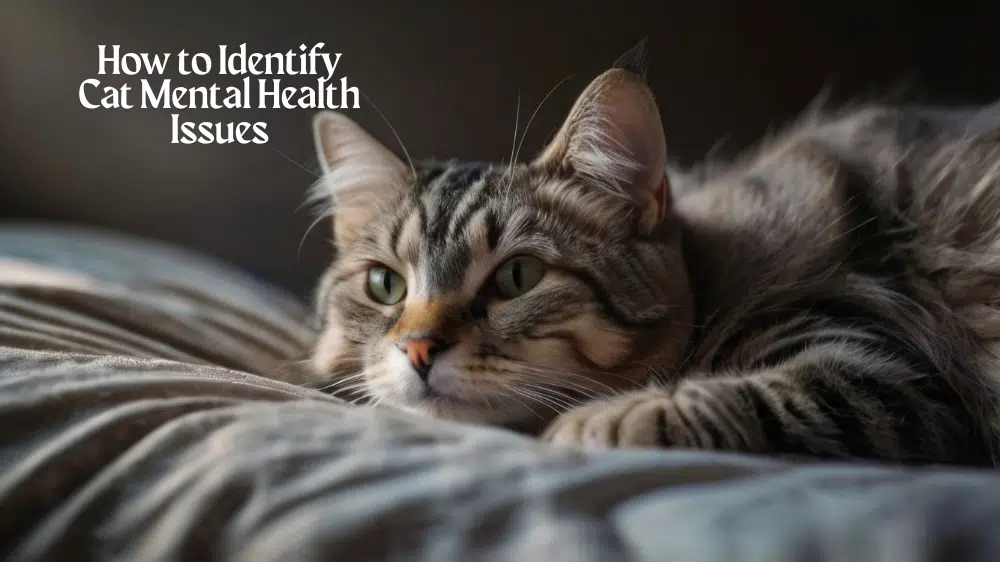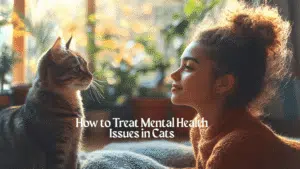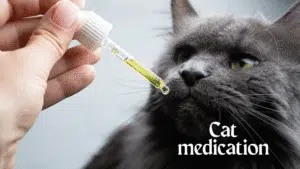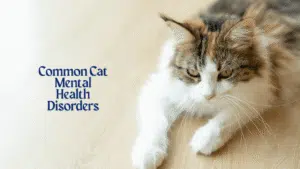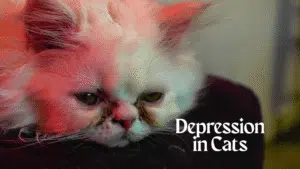“Cat mental health issues” is something that is most often ignored while is an important part of a feline care. Most pet owners think their cats’ odd behavior is just a part of their unique charm, but in reality cat mental disorders can cause them a great deal of distress and even health issues if not properly treated.
Knowing cat anxiety symptoms, signs of depression in cats and other behavior changes will help you recognize when your cat needs help. In this post, let’s explore how to identify and overcome mental health problems in cats to ensure that they live the happy and healthy life they deserve.
What Are Cat Mental Health Issues?
Like us, cats can experience a range of mental health and psychiatric problems. These can include stress in cats to even more severe ailments such as feline anxiety and “compulsive behaviors in cats”.
Common “cat mental health issues” are depression, anxiety and OCD-like symptoms. The problem is, cats can’t tell us how they feel in their own words— so it’s important to know cat behavior changes and recognize signs of mental health issues early.
How to Identify Cat Mental Health Issues
Signs of “cat mental health issues” are usually behaviour changes. Observant pet owners can use these changes to recognize when their cat is “off” with something. Cool and calm, unlike us humans, cats can’t vocalize their feelings, so it’s you who needs to pay attention to their behavior.
Common Signs of Mental Health Issues in Cats
Cats are fragile like that – they show their mental distress in a lot of different ways. If some cats begin acting a bit “off” it may be due to cat anxiety, depression, or OCD. Here are a few of the most common psychological conditions in cats:
1. Cat Anxiety
Symptoms of cat anxiety symptoms can present in several ways. You may see your cat appear unusually fidgety, pacing, or meowing excessively. Destructive behavior, such as scratching or knocking things down, can also indicate that your cat is stressed.
Causes of anxiety in cats: It’s common for cats to develop anxiety due to changes in their environment, such as moving to a new home, getting new pets, or experiencing separation from their owner.
2. Signs of Depression in Cats
The signs of depression in cats aren’t always easy to recognize, either, as they can be subtle. But key signs are a lack of interest in something your cat used to love doing — such as playing or exploring — as well as lethargy or a decrease in appetite.
If your cat suddenly becomes more reclusive or less loving than typical, depression could be to blame. This state can result from mourning, loneliness or even from chronic pain.
3. Obsessive-Compulsive Disorder (OCD)
As in humans, compulsive behaviors in cats can be caused by anxiety and stress. OCD in cats includes compulsive actions like licking, tail chasing, walking back and forth.
These may seem like odd behaviors, but they can be a way for some people to cope with stress or trauma. If his aggression is not addressed correctly, these behaviors could progress and impact your cat’s health.
4. Stress in Cats
There are many reasons that cats can become stressed — including a change in their living environment, conflicts with other pets, or even loud noises. Stress is reflected by hiding, appetite loss or aggression.
Some cats may even over-groom when they are anxious. If your cat is acting like this, it is important that you provide them with a peaceful, safe setting and talk with a veterinarian about possible behavioral therapy.
Table: Common Signs of Cat Mental Health Issues
| Mental Health Issue | Common Signs | Possible Causes | Recommended Actions |
| Cat Anxiety | Anxious, pacing and wandering, excessive meowing, destructive behavior | Changes in environment, boredom, separation anxiety | Create a safe environment: consult a vet if necessary. |
| Cat Depression | Anorexia, asthenia, reduced appetite, hiding | Loneliness, sadness, chronic pain, health issues | Up interaction, explore anti-anxiety meds, vet guidance |
| Obsessive-Compulsive Disorder (OCD) | Inordinate grooming, chasing of tail, repetitive actions | Oh, but it’s idiots and their sneers all the time, all the time (Fear, stress, lack of stimulation, trauma). | The changing of behavior, its medication |
| Stress in Cats | Concealing; appetite changes; aggression; over-grooming | Environmental differences, other pets fighting | Settle her flight nerves with calm companionship and see a vet about behavior therapy |
The Causes of Cat Mental Health Issues
Learn what causes “cat mental health issues”: It is important to know the causes of “cat mental health issues” to be able to identify and also treat such conditions in your cats.
Though the reason for this exact state of mind is different for each cat, there are generally three factors: genetics, environmental stress, and past trauma.
1. Genetics
And again, like with people, genetics can be a huge factor for mental health problems in cats. Some cats can have a genetic predisposition to certain diseases including depression and cat anxiety.
Breeds more prone to sensitivity (i.e., Siamese and Ragdolls) may be predisposed to experiencing these problems. If a cat is without mental health issues in his or her family history, that does not mean the cat himself/herself would not have stress in their behavior when they become older either.
If you suspect that your pet cat may carry a genetic risk factor for mental health problems, it’s necessary to monitor any significant cat behavior changes you see, in order to consider early intervention.
2. Environmental Stressors
One of the most common reasons for cat anxiety and other mental health problems is external environmental factors. Transitions and change in a cat’s environment can bring about anxiety even if the cat is sensitive to environments that differ from the normal. The most prevalent environmental stressors are:
- Moving to a new home: The unfamiliar sounds, sights and smells in a new home can be very unnerving to a cat – particularly one that has an anxious disposition.
- The introduction of new pets: Introducing new pets into the home such as a dog or another cat can cause stress if the existing cat feels insecure or threatened.
- Changes in the owner’s behavior: If the owner’s schedule changes (eg works longer hours, travels more), it can lead to anxiety, especially in cats with a strong bond with their owner.
A disruption in their environment can lead to stress in cats. If you’re struggling with a stressed-out cat, it comes down to re-establishing a sense of security and routine. This might involve establishing a safe environment, offering activities that enrich and sticking to a routine.
3. Trauma and Past Experiences
Cats who have been traumatized and neglected historically have a much worse mental health prognosis. Cats who are abandoned, abused, or subjected to other types of trauma may exhibit separation anxiety, aggression, or shyness. This is even more so for cats that have been adopted from shelters or abused by humans or their fellow animals.
Trauma can impact a cat’s mental health long-term, even if the symptoms aren’t immediately apparent. For example, a cat that has been neglected or abused might be fearful, anxious, or clingy under some circumstances.
One must take prior trauma into consideration when it comes to “cat mental health issues” in order to ensure we provide proper care. When that’s the case, how do I treat anxiety in cats? It can take some time, patience and, yes, even therapy to help your cat feel comfortable and safe again.
How to Treat Mental Health Issues in Cats
To treat cat mental health issues, we must address the conditions with suitable treatment. Be it anxiety symptoms, signs of depression or compulsive behaviors in cats, there are many treatment options that can help treat these conditions, ensuring a happy and healthy life for your precious cat. Early intervention and regular care can help your cat recover its mental equilibrium.
1. Environmental Changes
One of the first tasks with “cat mental health issues” is to make environmental modifications toward minimizing stress and anxiety. Cats are so perceptive of their surroundings, so providing a calm and enriched lifestyle is imperative to reduce stress in cats.
Modifying the environment often has the biggest impact for “how to treat anxiety in cats,” such as:
- Create a calm and secure space: Make sure your cat has a quiet area to which they can retreat if they become stressed out. This is how they feel safe and held.
- Enrich the environment: Give interactive toys, scratching posts, and other stimulation to avoid boredom and reduce stress. Mental exercise is very important to keep your dog healthy and enriched to reduce anxiety and misbehaviour..
- Maintain a consistent routine: Cats do best on schedules. Consistency with feeding, playtime, and human interaction can help to prevent the stress that change or unpredictability can cause.
By following these few simple tips, you can help to control “stress in cats” and have a much happier pet!
2. Medication
In the case of more serious cat mental disorders, medicine can be required to keep the symptoms in check. How to treat anxiety in cats:
If anxiety or depression starts to have a serious impact on your cat’s quality of life, medication is often the way to tackle it. Vets might prescribe drugs to help soothe your cat and alleviate symptoms.
Some typical treatments are:
- Anti-anxiety medications: These work to decrease cat anxiety symptoms such as excessive meowing, pacing, and destructive behavior.
- Antidepressants: If your cat is suffering from depression, medication may be used to stabilize their mood, appetite, and energy levels.
- Sedatives: These can be useful for cats that experience severe stressors or fear to help them mellow out in very stressful situations — like going to the vet or traveling.
Check with your vet to find the appropriate dosage and type for your cat’s needs when giving medicine. Veterinary care is essential when using medication to treat cat emotional problems, to verify the treatment has the desired effect and to check for side effects.
3. Behavioral Therapy
Cat behavioral therapy is also a highly effective method to help cats with mental issues, and one such cat problem is compulsive behavior such as too much grooming, tail chasing, or even non-stop moving.
This treatment supports in changing the behavior of your cat with this lemongrass scent using behavior training technique.
- Positive reinforcement: Lure and reward your cat for doing good behaviour, e.g. for lying down and being calm, play with him as a reward. to reinforce these responses and alleviate the anxiety.
- Desensitization: Slowly introducing your cat to things that make them anxious, like being alone or meeting a new pet, can help them become accustomed to these stressors in an easy and incremental way.
- Redirecting behavior: If your cat is engaging in compulsive behavior in cats like nonstop grooming or pacing, engage it with interactive toys or playtime.
Behavioral training is crucial for dealing with angry cat behavior, but if you have a cat with anxiety symptoms or mental disorders, a long-term therapy plan may become necessary. Enlist the help of your veterinarian or a veterinary behaviorist to create a customized behavior modification plan for your cat.
Common Cat Mental Health Disorders
Cats experience several cat mental health problems, similar to humans, that can impact their behavior and overall health. Though cat mental disorders can occur in various forms, some are more common and should be taken note of and addressed by the pet owner.
These disorders that include anxiety, OCD, and depression tend to interfere with your cat’s quality of life. Here, we take a look at some of the most common forms of mental health disorders cats can suffer from and explain how to spot and treat them.
1. Anxiety Disorders in Cats
Some of the commonest “cat mental health issues” are anxiety disorders. These fears can develop for most anything – from stress for a cat, a past experience or a change of environment for the cat. There are two main categories of cat anxiety disorders:
- Separation anxiety: This develops when the cat is too upset or worried about being apart from the owner. Cats that suffer from separation anxiety can also display the type of behaviors you described, i.e., excessive meowing, destructive behavior (especially scratching furniture or nibbling things) when left alone.
- Generalized anxiety: This is anxiety that persists for an extended period of time and for which there’s no discernible cause. Cat anxiety signs might include restlessness, pacing, hiding or avoiding social interaction.
How to treat anxiety in cats: Cat anxiety is usually treated with a combination of environmental modification, (which might include providing a safe place and enriching their environment), medication, and behavioral therapy. Cats feel more secure and mentally stimulated in an environment with less stressors.
2. Obsessive-Compulsive Disorder (OCD) in Cats
Feline obsessive-compulsive disorder (OCD) is a condition of cats, who carry out repetitive behaviors that appear to serve no purpose.
Many cats with OCD display signs such as over grooming, tail-chasing, or repetitive pacing. These behaviors may not seem harmful, but can escalate to be harmful or disrupt your cat’s daily activities.
The other theory as to the cause of OCD in cats being related to stress or trauma in a cat’s life. For instance, a cat that’s undergoing some drastic change in their environment (a new animal in the house, maybe) could develop compulsive behaviours as a coping mechanism for stress.
How to treat compulsive behaviors in cats: Treatment for OCD in cats is a multi-level process that involves behavior modifications and medications, as well as the environment.
It is important to discourage obsessive behaviors in cats by taking the following steps to reduce stress and to minimize boredom and frustration tried to relieve any stress or anxiety in the cat encouragement of playing and exercise.
Compulsive behaviors in cats can be treated. The use of desensitization, redirection and positive reinforcement can help with cats displaying compulsive behaviors in cats. Occasionally medication from your veterinarian can help control the compulsive problems and provide relief.
3. Depression in Cats
Cats can become depressed, just like humans. But signs of depression in cats are frequently subtle and can be harder to recognize for pet parents. Depressed cats may suffer from a number of symptoms, including disinterest in activities that they once found enjoyable, change in appetite, fatigue, and social isolation.
They might retreat or cower a little more than they would normally, not be so keen on being around their owners, sometimes not even grooming themselves correctly so their coats go dull.
There are many causes of depression in cats. It could be your home environment changed, moving to a place, loss of (an) other pet(s), or a radical change in routine. A cat’s depression may also be caused by chronic pain or illness, as the physical discomfort can ultimately result in emotional pain.
How to treat depression in cats:
Feline mental health care for feline depression is often both environmental and involves more interaction with the cat, and sometimes medication. Treating anxiety in cats also can work for depression because many depressive cats also have anxiety issues.
It is necessary to look for any medical conditions causing the depression and to treat that disorder. A vet may also advise medication to treat anxiety or depression while your cat is sick and its mood is down.
How to Prevent Cat Mental Health Issues
At least as important as treating “cat mental health issues” is preventing them. By being proactive, you can greatly decrease the likelihood of your cat developing anxiety, depression, and even compulsive behaviors.
Early and common attention is important to keep your own cat’s mental health healthy. Here are some effective prevention methods to help keep your cat mentally healthy.
1. Maintain a Consistent Routine
Cats are creatures of habit and when we talk understanding feline anxiety, the meaning is to appreciate that sudden changes or disruptions in the established routine can lead to stress and anxiety. It also makes your cat feel more secure, since they know what to expect day in and day out.
Here’s how sticking to a regular routine can offer you relief:
- Feeding: Try to feed your cat at the same times each day so your cat can get on a schedule.
- Playtime: Have regular playtimes to keep your cat active and engaged.
- Rest: Ensure your cat has quiet comfort to retreat to when they require rest. This will make them feel safe and secure.
A predictable routine will prevent your precious kitties from developing mental health problems in cats such as anxiety and depression, and gives them the sense of security they need to be comfortable and confident in their environment.
2. Provide Plenty of Physical and Mental Stimulation
Mental and physical engagement are the key to helping prevent “cat mental health issues”. If your cat doesn’t get enough stimulation, it can lead to boredom, stress or even compulsive behaviors. Getting regular physical exercise and mental stimulation can keep your cat entertained and happy.
- Interactive play: Play with toys that promote your cat hunting and pouncing. They’re great for keeping their brain engaged; puzzle feeders and treat-dispensing toys are also very good for this.
- Climbing and exploration: Cats like to climb and explore their vertical environment, so cat trees or shelves should be part of their furniture.
- Training sessions: Basic clicker training can offer a novel way to challenge your cat mentally and help them develop confidence.
You can help prevent cats from becoming stressed while helping them to be happier and more engaged which can help put an end to anxiety and other compulsively behavior.
3. Regular Veterinary Check-ups
Our veterinarians will recommend regular check-ups to help your cat stay healthy and for longer. Regular exams help your vet find any hidden conditions that may be causing mental health issues in cats. Sickness or long-term pain can cause issues behaviorally that may be misunderstood as anxiety or depression.
- Annual health check-ups: This is your vet’s low-down on your cat’s general health and behavior. If your cat is exhibiting feline anxiety or compulsive behaviors in cats, your vet can help with treatment advice.
- Behavioral consultations: If you are seeing concerning changes in behavior, a veterinary behaviorist can help determine the underlying cause of, and strategies for controlling or preventing, mental health problems.
- Vaccinations and parasite prevention: Maintaining the health of your cat with vaccinations and parasite control is also good for their mind.
You are the one who can really prevent cat mental health issues! Regular vet checks are really among the most important things that you can do to prevent your cat from mental health problems and help keep the cat healthy and happy!
Conclusion
Awareness, prevention, and cure of “cat mental health issues”, are essential for seeing to it that your pet can live a happy and healthy life. Like humans, cats can experience anxiety, depression, and compulsive behaviors that impact their quality of life.
The point is to be aware proactive in watching your cat’s behaviours, and recognising the symptoms of “mental health problems in cats” to stop them from becoming a bigger problem for your cat.
As pet parents we need to learn to read our cats and know when to call in professional help. Cat mental health is a significant part of maintaining your cat’s emotional equilibrium, and your vet can advise you on treatment for anxiety, depression, or other mental health conditions.
Keep in mind, as with physical health, cats need the proper mental care. Favoring their mental health and reacting early when symptoms of cat anxiety, depression or even ‘compulsive behaviors in cats’ are displayed, helps make the life of your cat a full, comfortable and stress free life.
Frequently Asked Questions (FAQs)
How do I know if my cat is depressed?
Answer: The cat mental disorders are commonly called cat behaviour problems. If you notice cat anxiety symptoms such as restlessness, excessive meowing, and disruptive behavior, or signs of depression in cats including decreased energy, decreased appetite, and social withdrawal, then that is the time to dial up a veterinarian.
If your cat begins a sudden disinterest in mental activities in combination with too much or very little interaction with you, or too much or very little withdrawal, it could mean your cat has mental health problems.
Can cats experience anxiety?
Answer: Yes, cats can have anxiety disorders just like humans, although in cats, the problem time or cause is not always easy to identify. Cat anxiety symptoms might manifest as too much vocalization, pacing, hiding or destructive behavior.
Cats’ anxiety is often due to environmental changes, boredom, or past trauma. Feline mental health care is useful in treating and alleviating anxiety.
Is depression common in cats?
Answer: While depression in cats may be subtle, it does exist. Signs of the depressed cat include a poor appetite, lethargy, a diminished interest in life and hiding. Environmental modifications, the death of a friend or constant pain may cause ‘depression in cats’.
It’s important to pay attention to these symptoms as soon as possible to be able to treat them effectively, whether that means medication, engaging in more activity, or altering the environment.
What is obsessive behavior in cats?
Answer: Compulsive behaviors in cats are repetitive behaviors cats do routinely, often to handle anxiety or another type of stress. This can manifest as over grooming, tail chasing, or pacing.
When not corrected, compulsive behaviors in cats have been known to increase with a potential for actual physical harm or greater emotional anxiety. These behaviors can be managed with behavioral therapy and sometimes medication.
How do I support my anxious cat?
Answer: If you notice that your cat is struggling with cat anxiety symptoms then one of the first things to do is establish a calm environment. Keep his environment calm and provide mental stimulation with toys and interactive play.
If your cat’s anxiety is ongoing, seeking help for how do you treat anxiety in cats in a solution-based chat with a veterinarian can point you in the right direction for behavioral therapy or medication.
Do cats suffer from mental health problems resulting from trauma?
Answer: Yes, trauma can cause mental health issues in cats. Cats who have gone through neglect, abuse, or major changes in their environment — such as moving to a new home — can experience cat stress, anxiety, or depression.
Traumatized cats often require extra expert care and patience — along with sensitive cat mental care — as they transition and learn to feel safe again in their new environment.
How do I avoid mental health problems with my cat?
Answer: Prevention is key! To avoid “cat mental health issues,” stick to a schedule, don’t skimp on physical and mental exercise, and ensure your kitty has routine vet visits.
Recognizing when to worry about feline anxiety and acting to mitigate sources of stress for your cat or changes in his behavior can lessen the risk of feline mental health problems.

